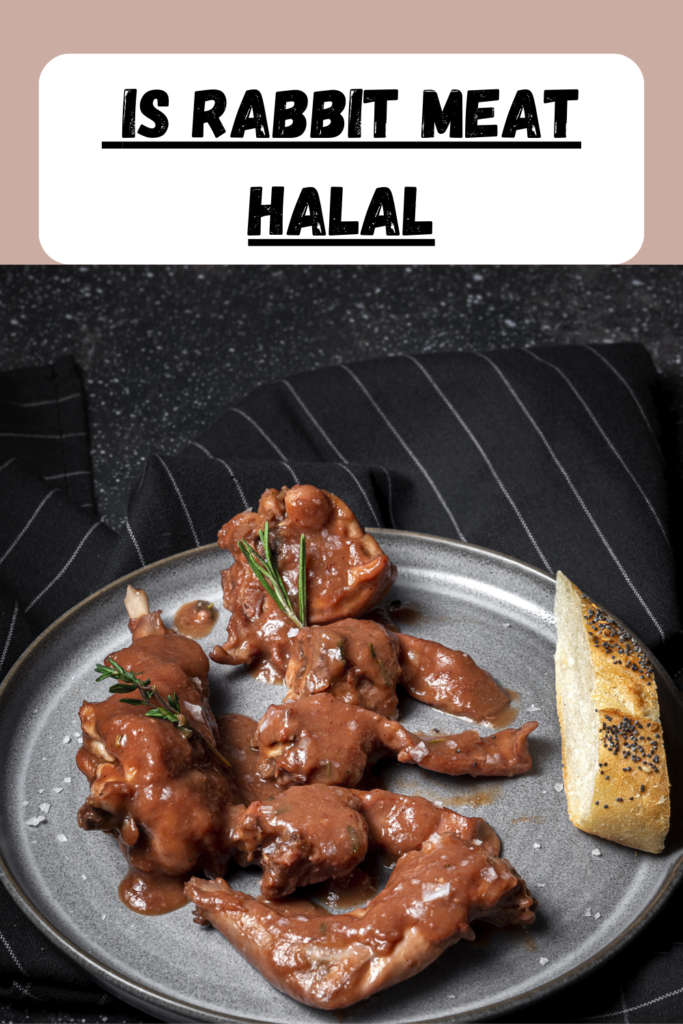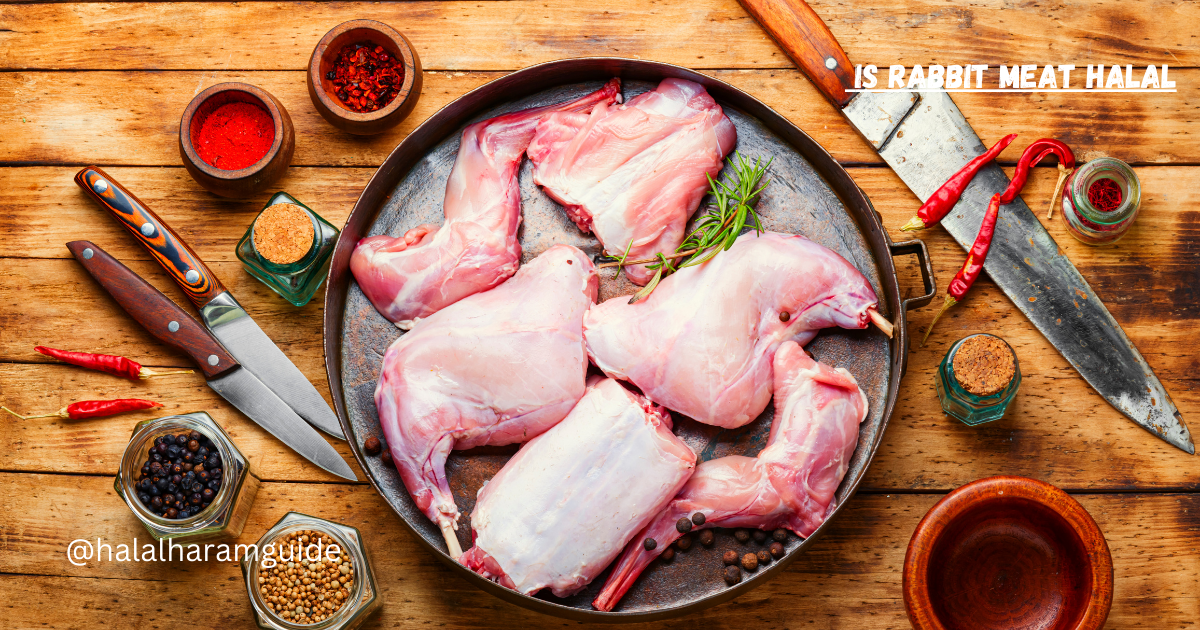Welcome to our blog, where we explore the fascinating realm of food and its compliance with Islamic dietary laws. Today, we’re delving into a question that has piqued the curiosity of many: Is rabbit meat halal?
If you’ve ever wondered whether this particular type of meat aligns with Islamic dietary guidelines, you’ve come to the right place. In this article, we’ll dissect the intricacies of rabbit meat and its status within the context of halal dietary practices.
So, let’s hop right into the discussion and find out if rabbit meat earns its place as a halal food.
Is Rabbit Meat Halal?
In Islamic dietary laws (halal), certain animals are considered permissible to eat, while others are not. Rabbits are generally considered halal to consume by most Islamic scholars and authorities, with some conditions and considerations:
Slaughter Method: The key requirement for an animal to be considered halal is that it must be slaughtered in the name of Allah (God) by a Muslim who is of sound mind and has reached the age of maturity. The slaughter should be done by swiftly cutting the throat, windpipe, and blood vessels in the neck, causing the animal to bleed out quickly and die as humanely as possible.
Cleanliness and Health: The rabbit being slaughtered should be healthy and free from any diseases or defects that would make it unfit for consumption.
Avoiding Cross-Contamination: When processing and preparing the rabbit for consumption, it’s important to avoid cross-contamination with non-halal substances and utensils. The same applies to cooking and serving utensils and surfaces.
Halal Certification: In many countries, there are halal certification authorities or organisations that inspect and certify food products, including meat products, to ensure they meet Islamic dietary requirements. Look for products with a reputable halal certification label if you want to be sure of their halal status.
It’s essential to note that interpretations of Islamic dietary laws can vary among different Islamic communities and scholars, so you should consult with your local religious authority or imam for specific guidance and to ensure that you are following the correct halal practices in your region. Additionally, it’s always a good practice to buy halal meat from reputable sources that follow proper halal procedures and guidelines.
Why is Rabbit Meat Halal?
Rabbit meat is considered halal, or permissible in Islamic dietary laws, primarily because it meets the foundational criteria outlined in Islamic jurisprudence for lawful consumption. The key factors that make rabbit meat halal include the method of slaughter, adherence to Islamic dietary guidelines, and the absence of contamination or impurities.
To be halal, rabbit meat must be slaughtered by a Muslim who is of sound mind and has reached the age of maturity. The slaughter must be performed by swiftly cutting the throat, windpipe, and blood vessels in the neck, while invoking the name of Allah (God). This method ensures that the animal dies as swiftly and humanely as possible.
Additionally, the meat must come from a rabbit that is healthy and free from diseases or defects. By meeting these criteria, rabbit meat aligns with the principles of halal consumption as prescribed in Islamic dietary laws, making it permissible for Muslims to eat.
Benefits of Eating Rabbit Meat:
Rabbit meat, often referred to as “bunny meat,” has gained popularity in various cuisines around the world due to its unique flavour and potential health benefits. Here are some of the benefits of eating rabbit meat:
Lean Protein: Rabbit meat is an excellent source of lean protein. It is low in fat and cholesterol, making it a healthy option for those looking to reduce their saturated fat intake.
Low in Calories: Rabbit meat is relatively low in calories compared to other meats like beef, pork, or lamb. This makes it a good choice for individuals who are watching their calorie intake.
High in Nutrients: Rabbit meat is rich in essential nutrients such as vitamins B3 (niacin), B12, and minerals like iron, phosphorus, and selenium. These nutrients are important for various bodily functions, including energy metabolism and the formation of red blood cells.
Low in Saturated Fat: Rabbit meat contains less saturated fat than many other meats, which can be beneficial for heart health when consumed as part of a balanced diet.
Easily Digestible: Rabbit meat is known to be easily digestible, making it a suitable option for individuals with digestive sensitivities or those recovering from illness.
Sustainable: Rabbit farming is often considered more environmentally friendly and sustainable than raising larger animals like cows or pigs. Rabbits reproduce quickly and require less space and food compared to other livestock.
Versatile: Rabbit meat has a mild, slightly sweet flavor that can adapt well to a variety of cooking methods and cuisines. It can be roasted, grilled, stewed, or used in various recipes.
Low Allergenicity: Rabbit meat is less likely to cause allergies compared to some other meats like beef or poultry, making it a good option for people with food sensitivities.
Omega-3 Fatty Acids: While not as high as fatty fish like salmon, rabbit meat does contain some omega-3 fatty acids, which are important for heart and brain health.
Cultural and Culinary Diversity: Rabbit meat is featured in the cuisines of many cultures, from European dishes like rabbit stew to Middle Eastern dishes like rabbit kebabs. Exploring these culinary traditions can be a rewarding experience.
It’s important to note that the preparation and cooking method can affect the nutritional profile of rabbit meat. For the healthiest option, consider grilling, roasting, or baking rabbit meat with minimal added fats and seasonings. Additionally, as with any meat, moderation is key, and it should be consumed as part of a balanced diet for optimal health benefits.
Views of Hadiths:
Hadiths are a significant source of guidance and tradition in Islam. They are the recorded sayings, actions, and approvals of the Prophet Muhammad (peace be upon him) and play a crucial role in shaping Islamic beliefs, practices, and jurisprudence. Views on Hadiths vary among Muslims, but some common perspectives include:
Authenticity and Reliability: Many Muslims view Hadiths as essential for understanding the context and details of Islamic teachings and consider them a valuable source of religious knowledge. The authenticity of Hadiths is a critical concern, and scholars have developed a rigorous science of Hadith authentication to determine which Hadiths are reliable.
Primary Source of Sunnah: The Sunnah, which encompasses the practices and teachings of the Prophet Muhammad, is considered a primary source of Islamic guidance. Hadiths are instrumental in preserving and conveying the Sunnah, allowing Muslims to emulate the Prophet’s way of life.
Is Rabbit Halal in Shia?
In Shia Islam, the permissibility of consuming rabbit meat, also known as the halal status of rabbit meat, generally aligns with the broader principles of Islamic dietary laws. In Shia jurisprudence, the key factors that determine whether rabbit meat is considered halal include the method of slaughter, the absence of contamination or impurities, and adherence to Islamic dietary guidelines.
Shia scholars generally agree that if rabbit meat is slaughtered in accordance with the Islamic method, which involves invoking the name of Allah (God) and ensuring proper drainage of blood, it can be considered halal for consumption.
As long as the meat meets these criteria and is obtained from a lawful source, Shia Muslims typically regard rabbit meat as permissible for consumption within the framework of Islamic dietary laws.
However, it is important for individuals to consult with their local scholars or religious authorities for specific guidance and to ensure compliance with their particular religious beliefs and practices.
Is Rabbit Halal Hanafi?
In Hanafi jurisprudence, which is one of the four major Sunni schools of thought, there is some difference of opinion regarding the permissibility of rabbit meat. According to some Hanafi scholars, rabbit meat is considered makruh (discouraged) rather than strictly haram (forbidden).
The primary reason behind this view is the interpretation of a specific Hadith that is considered weak or da’if (less reliable) by some scholars. However, other Hanafi scholars may take a more conservative stance and discourage the consumption of rabbit meat altogether.
It’s important to note that opinions within the Hanafi school may vary, and individuals should consult with their local scholars or religious authorities for specific guidance.
Conclusion
In conclusion, the permissibility of consuming rabbit meat, or its halal status, can vary depending on the interpretation and adherence to Islamic dietary laws within different Islamic schools of thought.
Generally, when rabbit meat is slaughtered in accordance with Islamic principles, it is considered halal for consumption. However, interpretations may differ, particularly within the Hanafi school, where there can be varying views ranging from discouragement to permissibility.
Ultimately, individuals seeking clarity on the halal status of rabbit meat should consult with their local scholars or religious authorities to ensure compliance with their specific religious beliefs and practices.
Frequently Asked Questions
Do Rabbits Eat Meat?
No, rabbits are herbivores, which means they primarily eat plant-based foods. Their diet consists of various grasses, hay, leafy greens, vegetables, and sometimes fruits. They do not eat meat, as they are not equipped with the digestive system or natural instincts for carnivorous consumption.
Is A Pet Rabbit Halal to Eat?
In Islamic dietary laws (halal), it is generally not permissible to eat pets, including pet rabbits. The concept of halal primarily applies to specific animals that are raised and slaughtered for food consumption. It is important to distinguish between pets and livestock raised for meat.
Are Hares Halal?
Hares, which are related to rabbits, are subject to similar rules as rabbits in terms of halal status. In Islamic jurisprudence, hares can be considered halal if they are slaughtered according to Islamic principles and dietary guidelines. The key factors are the method of slaughter, invoking the name of Allah, and ensuring proper drainage of blood.
Is Rabbit Meat Nutritious?
Yes, rabbit meat is considered nutritious. It is a lean source of protein and provides essential nutrients such as vitamins B3 (niacin), B12, iron, phosphorus, and selenium. It is also relatively low in calories and saturated fat, making it a healthy option for those looking to maintain a balanced diet.
What are five interesting facts about Rabbits?
Rabbits are prolific breeders, with the ability to reproduce rapidly. A single pair of rabbits can produce numerous offspring in a year.
Rabbits have a unique digestive system that requires them to eat their own faeces, known as “cecotropes,” to fully extract nutrients from their food.
They have large, powerful hind legs designed for hopping and jumping, which allow them to evade predators.
Rabbits are crepuscular animals, meaning they are most active during dawn and dusk.
Contrary to the popular myth, carrots are not an ideal primary food for rabbits. While they can eat carrots, a diet primarily composed of carrots can be unhealthy for them due to the high sugar content.
Are rabbits friendly with humans?
Rabbits can be friendly and form bonds with humans, especially when they are socialised and handled from a young age. However, their temperament can vary from one individual to another. Many pet rabbits enjoy human companionship and can be affectionate, but they may also be cautious or shy at times. Building a positive relationship with a pet rabbit involves patience, gentle handling, and providing a safe and comfortable environment for them.
- “Is Lobster Halal? Understanding Its Permissibility”
- “Is Drawing Haram in Islam? Understanding the Perspective”
- “Is Fermented Kimchi Halal? Exploring Kimchi’s Halal Status”
- “Is Collagen Halal? Unveiling the Halal Status of Collagen”
- “Is Wine Vinegar Halal? Unveiling Its Permissibility”


